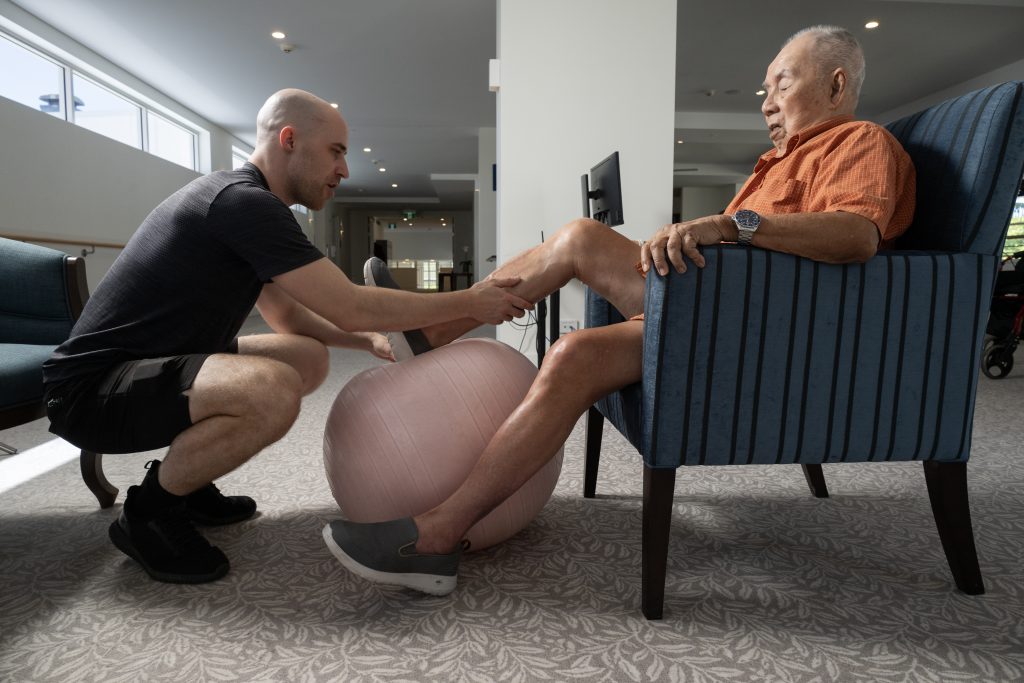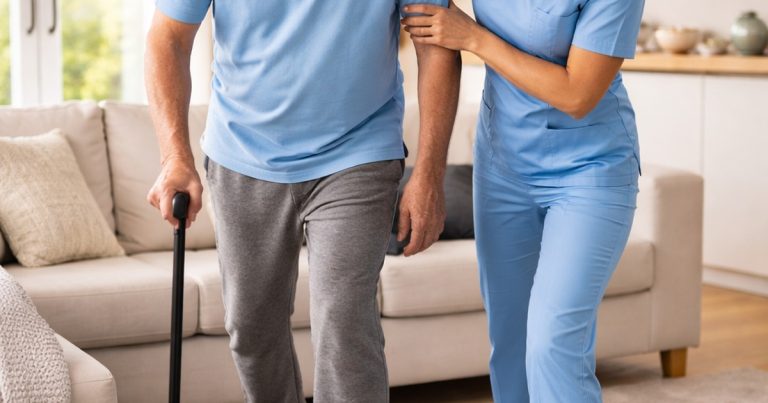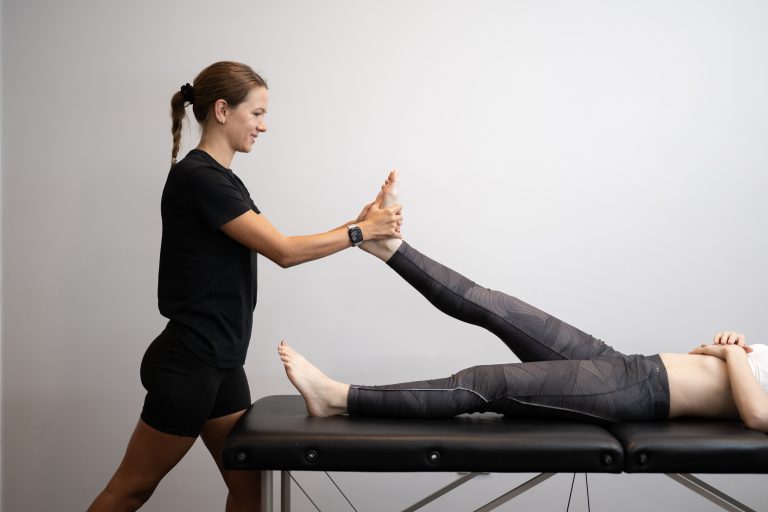You are out with your friends, club, or team, playing sport like football or rugby. The sudden turn that you make in response to the opposition causes you to feel and hear a snap in your knee, which is then followed by excruciating pain and swelling. You stumble and need medical attention. The physio tells you it is your ACL. If you have recently suffered an anterior cruciate ligament injury, then the skilled staff at GM Physiotherapy can explain how physiotherapy and a customised rehabilitation treatment can help you recover from an ACL injury.
What is an Anterior Cruciate Ligament or ACL?
The anterior cruciate ligament, sometimes known as the ACL, is an essential source of support for the knee joint. It is one of the most important ligaments that helps to keep the knee stable. It is essential for the correct movement of the knee as well as stability. A torn ACL can be a serious injury that can have implications on your health, your mobility, and ultimately your life.
ACL tears are common in high-intensity sports like football, rugby, skiing, and snowboarding, where the knee is often bent as a result of running to pivot or change directions. Unfortunately, it is common to injure other structures, such as the cartilage or meniscus, in the same incident.
If you have an injured ACL, you may be able to continue with your normal daily activities; however, continuing to play or compete in sports is not an option, and many potential athletic careers are put at risk as a result of ACL injuries.
Some, but not all ACL injuries require ACL reconstruction surgery. Grade 1 and Grade 2 injuries can often heal without surgery and with physiotherapy alone. Either way, physiotherapy treatment is crucial following an ACL injury to ensure optimal healing and for future injury prevention.
ACL Injuries Grade
Grade 1
Because the ligament is just a little strained, the damage that has occurred is rather little. Stability is maintained in the knee joint.
Grade 2
The ligament is being stretched to the point where it is unstable and loose. These are known as partial tears.
Grade 3
This ligament is ruptured, and the ACL has been completely torn. The knee joint can be unstable, and the ligament can be split in the middle or severed from the bone.
Symptoms of an ACL Tear
This injury is common among athletes, especially in sports that require quick pauses and changes in direction.
- A loud “pop” sound at the time of the injury.
- The knee can feel unstable or as if it is “giving way” with weight-bearing.
- Severe knee pain, inability to continue physical activity.
- Severe swelling of the knee.
- Inability to move freely
- Tenderness across the joint line
- Walking with discomfort.
Physical exams and imaging tests, such as an MRI, are commonly used to diagnose. Depending on the severity of the tear and the patient’s activity level, treatment might range from rehabilitation, to restore strength and prevent knee instability, to surgery.
How Does Physiotherapy Help in Rehabilitation?
There is no question that tearing the anterior cruciate ligament (ACL) can be a devastating injury. There are several treatment methods available for ACL injury. It is possible for the “knee-jerk” reaction to involve surgical reconstruction of the ACL; however, not all ACL injuries require surgery. At GM Physiotherapy, we have helped a lot of patients in recovering from ACL injury to returning to competitive sports.
Physiotherapy for ACL tears, or physical therapy, focuses on lowering pain and swelling in order to assist in the restoration of the knee’s function and range of motion. The goal is to restore strength to the muscles of the thigh and the leg as a whole, as well as to stabilise the knee through strengthening exercises. In order to improve knee stability as quickly as possible, it is often recommended to wear a knee brace.
How Our Physiotherapists Help After an ACL Injury
We at GM Physiotherapy have a team of experienced professionals who work closely with patients who are recuperating from an ACL injury to assist them in regaining their strength, function, and confidence. Specifically, our tailored approach and personalised rehabilitation programmes focus on:
- Reducing swelling and pain
- Restoring full range of motion
- Strengthening the knee, joints, legs, and pelvis
- Improving kneecap alignment
- Enhancing mobility and balance
- Lowering the risk of re-injury
Our physiotherapists are here to give you guidance at each step of the rehabilitation process, whether you are in the early stages of recuperation or working towards returning to your sport.
When Knee Surgery May Be the Best Option
In some cases, knee surgery may be the best option for a torn ACL. This is frequently advised when:
- The patient is younger and has many active years ahead
- There is a strong desire to return to high-level or competitive sports
- The ACL tear occurs alongside other knee injuries (e.g. meniscus damage)
- The injury is severe enough to make daily activities, such as walking, difficult
However, it’s worth noting that not all severe (high-grade) ACL injuries require surgery. With the help of a well-structured rehabilitation program, many people are able to successfully manage their ACL rupture and avoid surgery altogether.
How the ACL Rehabilitative Therapy Works
When it comes to treating ACL injury, the treatment might need both surgery and physiotherapy. Whether or not you decide to have surgery on your ACL, it is essential that you participate in an organised rehabilitation program.
Regaining strength, mobility, and stability are all important to safely returning to sports and other forms of physical activity, and participating in guided ACL rehabilitation can help you accomplish all three of these goals. Not only does rehabilitation ensure you are healing properly, but it also helps to reduce the possibility that you will sustain another injury in the future.
Conclusion
When recovering from an injury to the anterior cruciate ligament, whether it be a minor sprain or a complete tear, it is important to have the proper guidance, commitment, and meticulous care. There are some people who may require ACL reconstruction or ACL surgery, specifically depending on the severity of the injury; nevertheless, there are others who may benefit from a therapy plan that does not involve surgery. In either case, rehabilitation, including physical therapy, is required.
At GM Physiotherapy, our top priority is to assist you to reduce pain and swelling, regaining function in your injured knee, and returning to sports that involve you having to run, pivot, or jump in a safe way. If you are using a crutch after surgery or trying to restore strength after a knee ligament injury, our skilled staff will offer targeted exercise, manual therapy, and information to help your healing process.
The knee may take some time to recover, but with a tailored program and ongoing assistance, you can resume an active lifestyle and participate in sports.
Take the First Step in Your ACL Recovery
Whether you’re preparing for ACL reconstruction, recovering from ligament injuries, or looking for non-surgical options, we at GM Physiotherapy can help. Call us today at 0478 941 638. Let us create a personalised treatment plan to get you moving confidently, without pain and back to doing what you love.





 Back to all posts
Back to all posts

